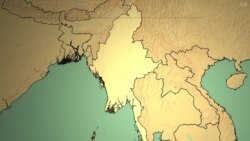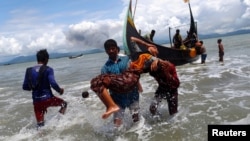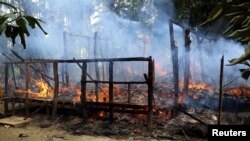The Rohingya have long been seen as one of the world's most persecuted minority groups. Despite having a long history in Myanmar, the mostly Muslim group — some are Hindu — is not officially recognized by the government, which considers them illegal migrants from neighboring Bangladesh. They are also subject to intense societal and governmental discrimination in Buddhist-majority Myanmar.
How many Rohingya are there?
More than one million Rohingya are believed to live in Myanmar - a relatively small percentage of the country's overall population of 53 million; but, that percentage is becoming smaller every day, as masses of Rohingya continue to flee violence and persecution in the country's western Rakhine state. According to U.N. figures, an estimated 370,000 Rohingya have crossed into neighboring Bangladesh since late last month, when the latest round of violence broke out.
How long have the Rohingya lived in Myanmar?
Many Rohingya can show that their families have lived in Myanmar for generations, but the government does not include Rohingya as one of its 135 officially recognized ethnic groups. It instead refers to them as "Bengalis," and pushes the inaccurate perception that all Rohingya came illegally from Bangladesh. They are, therefore, one of the world's largest technically stateless groups.
What other rights are the Rohingya denied?
The Rohingya are denied citizenship under Myanmar’s 1982 Citizenship Law. As a result, their rights to study, work, travel, marry, practice their religion and access health services are severely restricted, according to Amnesty International. Many live in squalid concentration-like camps. Recently, the U.N. described their situation as a "textbook example of ethnic cleansing."
What led to the latest unrest?
The violence erupted on August 25, when a group of Rohingya militants - armed with homemade bombs, knives and sticks - attacked dozens of police posts and an army base in what they said was an effort to protect their ethnic minority from persecution. The Arakan Rohingya Salvation Army, formed last year by Rohingya exiles, claimed responsibility for the attack, which killed 12 security personnel.
How did the government respond?
Myanmar's military launched a counteroffensive that included shellings, arson and widespread extrajudicial killings that have left at least 400 people dead. Although the military denies targeting civilians, the United Nations' top human rights official says the campaign is "clearly disproportionate." A government official says 176 Rohingya villages now lie empty after residents fled the violence.
How often does violence break out?
Although Rohingya have faced government and societal discrimination for decades, the violence has worsened in recent years. After a major outbreak of violence in 2012, Buddhist-Muslim tensions have simmered. The tensions have occasionally bubbled over, and combined with a rise in hardline, Buddhist nationalist sentiment, have resulted in periodic waves of anti-Muslim attacks.
How has the world responded to the crisis?
Western governments, as well as those in Muslim-majority countries, have put increasing pressure on Myanmar's government to stop the bloodshed and provide equal rights for Rohingya. They have especially been critical of Myanmar's de factor leader, Aung San Suu Kyi, who has said that the international Rohingya problem is being exaggerated.
Some of Myanmar's neighbors, including India and China, have been supportive of the campaign, saying the country has every right to secure the "stability" of its territory.








